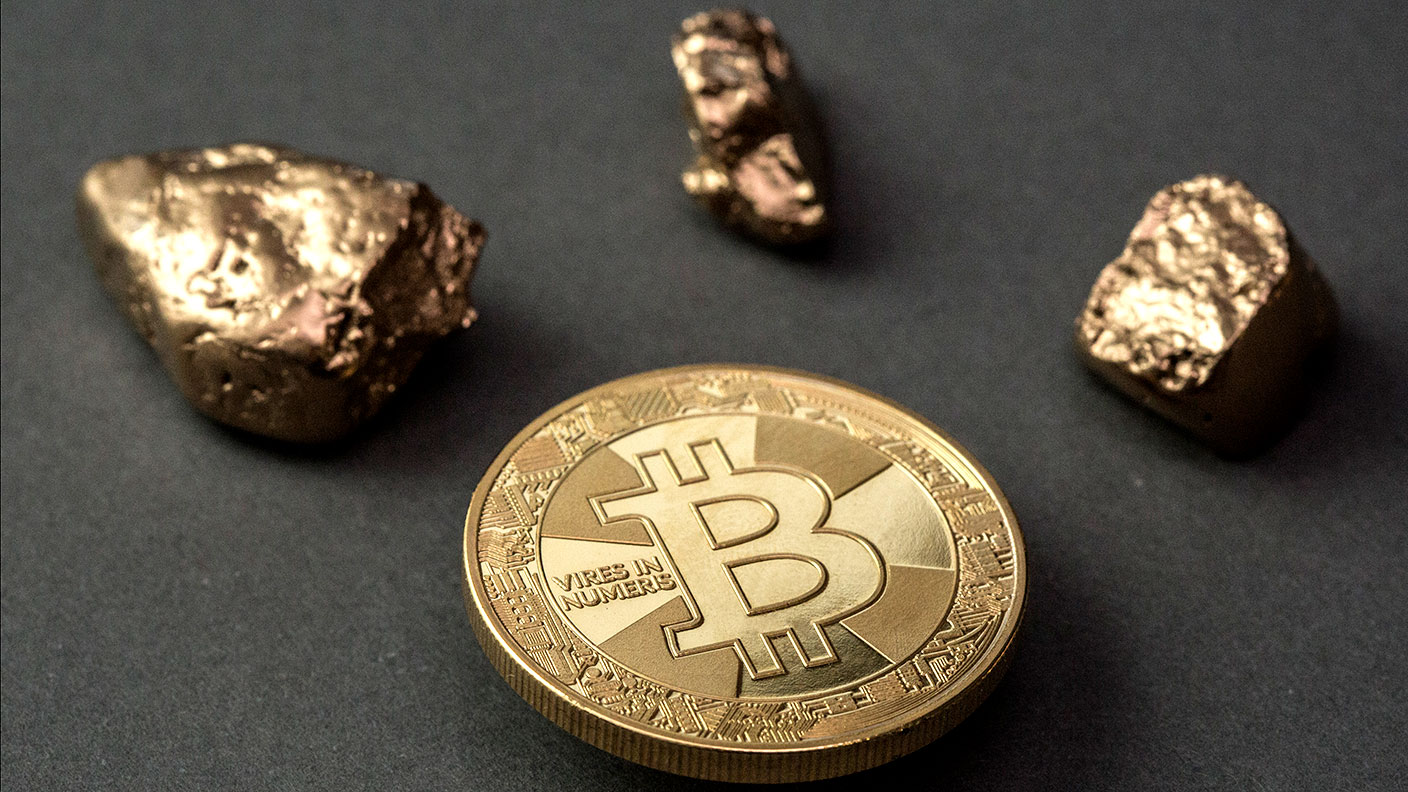Why you should own bitcoin and gold as inflation returns
Bitcoin and gold are both useful assets to own in an inflationary environment – Charlie Morris explains why.


Get the latest financial news, insights and expert analysis from our award-winning MoneyWeek team, to help you understand what really matters when it comes to your finances.
You are now subscribed
Your newsletter sign-up was successful
Want to add more newsletters?
An increasing number of investors believe that cryptocurrency bitcoin has become an institutional-grade asset class – I agree. Some even believe that bitcoin replaces gold’s function in a portfolio. But with that, I disagree. Here’s why I believe that investors should own both – particularly in an inflationary environment.
Bitcoin’s recent strength reflects an exciting new digital financial world which isn’t going away. By owning bitcoin, you are exposed to that growth, and own a digital “hard” asset. With ever-fewer bitcoins being created in the future (see the box below), bitcoin will become increasingly scarce. By the year 2032, a high bitcoin price will be nearly 90% cheaper to sustain than it would be today. The miners (the supercomputers that solve the very hard sums that both create new bitcoins and allow transactions to be processed and logged on the blockchain) are paid to support and maintain the network, but will receive ever fewer bitcoins over time, with the resulting “inflation” rate approaching zero within a decade.
Where bitcoin and gold differ
The new supply of gold is also on a downward slope. This commonality between the two assets has gained much attention. Both gold and bitcoin are deemed to protect investors from inflation, which is one reason why some investors see them as interchangeable – or bitcoin as “gold 2.0”. But this is where they’re wrong.
Try 6 free issues of MoneyWeek today
Get unparalleled financial insight, analysis and expert opinion you can profit from.

Sign up to Money Morning
Don't miss the latest investment and personal finances news, market analysis, plus money-saving tips with our free twice-daily newsletter
Don't miss the latest investment and personal finances news, market analysis, plus money-saving tips with our free twice-daily newsletter
The main difference between the two is that bitcoin thrives during “risk-on” conditions, whereas gold prefers “risk-off”. Risk-on occurs when the economy is growing, bond yields are rising (and so bond prices are falling), and animal spirits are in the air. In contrast, gold thrives when real interest rates (that is, bond yields minus inflation expectations) are declining. In other words, when inflation is rising yet bond yields are rising more quickly – which is what we’ve seen recently – that puts downward pressure on the gold price. By contrast, if inflation is rising more quickly than bond yields, you should expect gold to outperform bitcoin. In short, these two assets are not in competition – they are inherently different.
To see this in action, think back to the market panic in March 2020. When measured in pounds sterling, the gold price didn’t budge, whereas bitcoin’s price halved. A few months later, gold was all the rage as inflation expectations recovered while there remained doubts about the state of the economy, and thus bond yields remained low amid investor and central bank caution. This all came to an abrupt end when bond yields started to rise in August. That was the moment that the economy started to recover, and gold handed the baton to bitcoin. It was a macroeconomic shift. The next time the economy turns down, expect bitcoin to hand the baton back to gold.
So bitcoin is not replacing gold, and neither is it in competition – instead they serve completely different purposes. Both are inflation-sensitive assets that thrive at different times, and for different reasons. This makes them ideal partners, to be held sided by side. I believe this asset mix is unparalleled in protecting investors during an inflationary environment.
Bitcoin plus gold = BOLD
Owning both has its merits, but how much of each? That could reflect your personal conviction – but as always in finance, there is a better answer. From a risk management perspective, a combination between 80/20 and 70/30 (that is, the percentage split between gold and bitcoin within that part of your overall portfolio allocated to them) has delivered the best risk-adjusted returns in the past. That means the maximum return for the lowest level of volatility (ie, ups and downs) and drawdowns (periods where you’re making a loss, on paper at least).
The key to success comes not just from the asset returns, but from rebalancing. Bitcoin is volatile whereas gold is relatively calm (note, relatively). Each time you rebalance – that is, review your exposure to each and return it to the original 80/20 or 70/30 starting point, you are effectively taking profits from one asset, and banking them in the other. Regular time intervals – say monthly – between rebalancing transactions is most effective, because sharp moves tend to be short-lived.
Clearly if bitcoin goes to $1m and gold stays put, you would be better off in bitcoin. But a truly lofty bitcoin price might not happen until 2032, and indeed, it might never happen at all. The remarkable quality of rebalancing is that if both assets end up at today’s prices in five years’ time, you will have made money, as the transactions will have captured value from rebalancing transactions along the way. In contrast, a fixed allocation, without rebalancing transactions, would have made no money at all. Add to that, if bitcoin drifts towards zero dollars, it will do so with even higher volatility than seen today. That will mean you own a modest position, which will see off the worst outcomes.
As we enter an inflationary world, the BOLD (bitcoin plus gold) concept is ideally placed to benefit. It works in both risk-on and risk-off environments, with the downside coming from a return to deflationary times. With the printing presses running red hot, how likely is that?
Charlie Morris is chief investment officer at ByteTree Asset Management. Follow him on Twitter: @AtlasPulse
Get the latest financial news, insights and expert analysis from our award-winning MoneyWeek team, to help you understand what really matters when it comes to your finances.
-
 Inheritance fights are up 80% – here’s why and what to do if it happens to you
Inheritance fights are up 80% – here’s why and what to do if it happens to youFamilies are increasingly disputing inheritances, as age-related and economic factors force a tussle over the last will and testament of loved ones. What should you do if you find yourself in the middle of a fight over money?
-
 The northern powerhouse city where first-time buyers are snapping up properties
The northern powerhouse city where first-time buyers are snapping up propertiesFirst-time buyers are “casting their nets” wider to find properties that match their budgets and lifestyles. We look at the top areas for first-time buyers.
-
 How to invest as the shine wears off consumer brands
How to invest as the shine wears off consumer brandsConsumer brands no longer impress with their labels. Customers just want what works at a bargain price. That’s a problem for the industry giants, says Jamie Ward
-
 A niche way to diversify your exposure to the AI boom
A niche way to diversify your exposure to the AI boomThe AI boom is still dominating markets, but specialist strategies can help diversify your risks
-
 New PM Sanae Takaichi has a mandate and a plan to boost Japan's economy
New PM Sanae Takaichi has a mandate and a plan to boost Japan's economyOpinion Markets applauded new prime minister Sanae Takaichi’s victory – and Japan's economy and stockmarket have further to climb, says Merryn Somerset Webb
-
 Early signs of the AI apocalypse?
Early signs of the AI apocalypse?Uncertainty is rife as investors question what the impact of AI will be.
-
 8 of the best properties for sale with beautiful kitchens
8 of the best properties for sale with beautiful kitchensThe best properties for sale with beautiful kitchens – from a Modernist house moments from the River Thames in Chiswick, to a 19th-century Italian house in Florence
-
 Three key winners from the AI boom and beyond
Three key winners from the AI boom and beyondJames Harries of the Trojan Global Income Fund picks three promising stocks that transcend the hype of the AI boom
-
 RTX Corporation is a strong player in a growth market
RTX Corporation is a strong player in a growth marketRTX Corporation’s order backlog means investors can look forward to years of rising profits
-
 Profit from MSCI – the backbone of finance
Profit from MSCI – the backbone of financeAs an index provider, MSCI is a key part of the global financial system. Its shares look cheap
